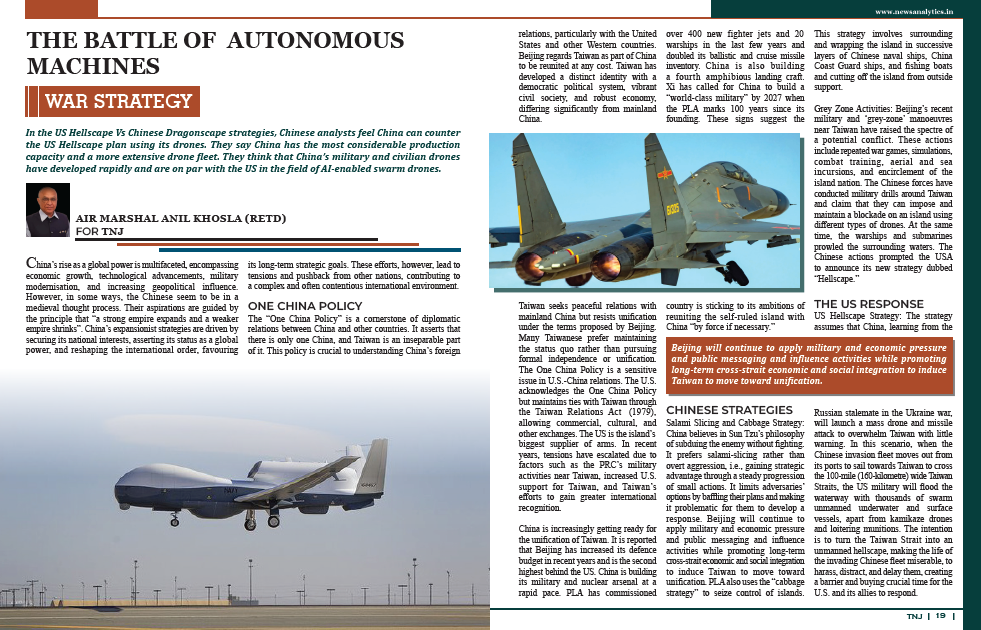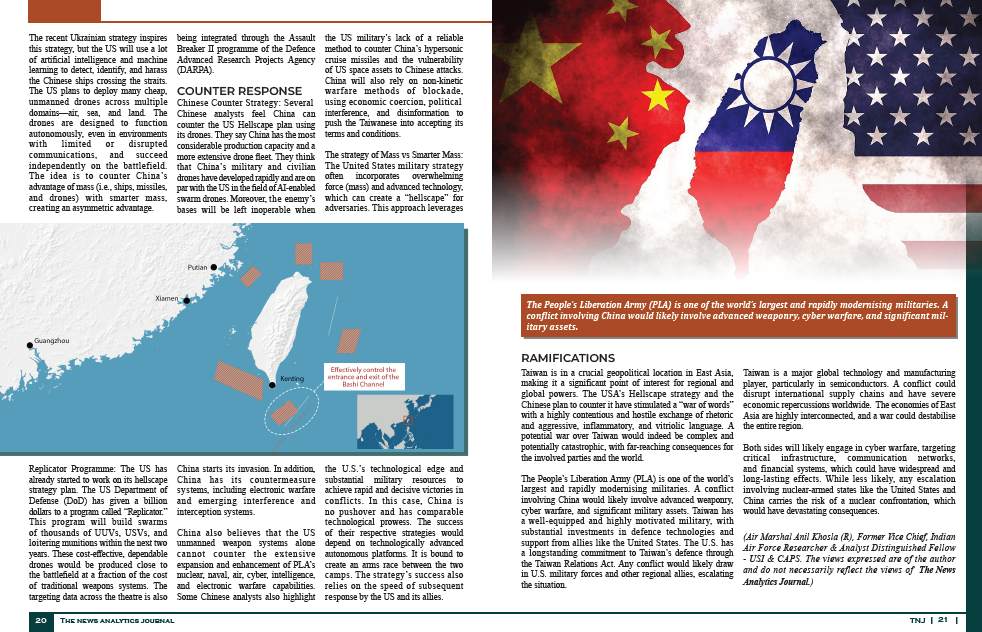
My article published on Chanakya Forum website
on 02 Oct 24.
The Boeing AH-64 Apache is an American twin-turbo shaft attack helicopter with a tail wheel-type landing gear and a tandem cockpit for a crew of two. Nose-mounted sensors help acquire targets and provide night vision. It carries a 30 mm (1.18 in) M230 chain gun under its forward fuselage and four hard points on stub-wing pylons for armament and stores, typically AGM-114 Hellfire missiles and Hydra 70 rocket pods. Redundant systems help it survive combat damage. Boeing claims the AH-64E to be the world’s best and most advanced multi-mission attack helicopter. According to Boeing, it is the only combat helicopter with a spectrum of capabilities for virtually any mission requirement, including greater thrust and lift, joint digital operability, improved survivability, and cognitive decision-aiding. The technical details of the helicopter are appended.
Boeing also claims it delivered the first US Army Apache AH-64A in January 1984. Since then, the US Army and other nations have received more than 2,700 AH-64 Apache attack helicopters. Boeing’s global customers for the Apache include Egypt, Greece, India, Indonesia, Israel, Japan, Korea, Kuwait, the Netherlands, Qatar, Saudi Arabia, Singapore, the United Arab Emirates and the United Kingdom. These aircraft in operation have accumulated over five million flight hours, 1.3 million of which have been in combat.
In India, Tata Boeing Aerospace Limited (TBAL), a joint venture between Boeing and Tata Advanced Systems Ltd. (TASL), established in 2016, manufactures fuselages for the AH-64 Apache. TBAL’s Hyderabad facility has been delivering AH-64 Apache fuselages since 2018. The advanced manufacturing facility will eventually become the sole producer of AH-64 fuselages worldwide, with 90% of parts sourced from Indian suppliers. The Indian Air Force has a fleet of 22 AH-64E Apache attack helicopters bought in 2015. In 2020, Boeing signed an agreement with the Government of India to acquire six more Apache helicopters for the Indian Army. The 4,100 crore contract stipulated that these aircraft would be delivered in two batches at the beginning of this year. On March 24, it was disclosed that the delivery of these aircraft would be delayed by over a year.
Delay. The procurement agreement initially stipulated the delivery of all six helicopters by February 2024. The first batch of three Apache helicopters is now expected to be delivered by late 2024 or early 2025, with the remaining three projected to arrive three to four months later. Various reasons are being speculated as the cause for the delay.
- Supply chain. Boeing has indicated supply chain problems as the possible reason for the delay.
- Priorities and Allocations Systems Program (DPAS). Another hurdle to the Apache project was related to India’s low ranking in a US government programme that prioritised foreign customers. The US uses DPAS to prioritise defence-related contracts throughout the US supply chain to support military, homeland security, critical infrastructure and other requirements. This seemingly affected 22 critical components fitted on the Apaches, including engines, gearboxes, and weapons. However, the issue was resolved after prolonged discussions between the two sides.
- Technical Issues. Open-source media reports are also emerging about technical issues related to the helicopter’s electrical systems (power generator) failures, causing safety concerns. Boeing has reportedly temporarily halted all Apache deliveries until these concerns are addressed and resolved.
Tejas Delays. The delay in the Apache delivery is not an isolated incident. It comes after US engine maker General Electric delayed the delivery of GE F-404 jet engines that power India’s indigenous Tejas jets. This has pushed the delivery of the first production of Tejas Mk1 from March 2024 to November 2024. GE Aerospace, responsible for providing these engines, collaborates with Hindustan Aeronautics Limited (HAL). The delivery schedule of the Tejas jets, which are critical for replacing ageing MiG-21 fighters in the Indian Air Force, has been pushed back. These delays are causing significant concerns for the Indian military’s modernisation programs.
Indo-US Cooperation (Defence and Aerospace). The US-India partnership in defence and aerospace has recently become one of the most vital engagement sectors, merging both countries’ strategic and geopolitical interests. Unfortunately, with all its strategic elements, the defence partnership has an overbearing buyer-seller dimension. India has already acquired several US military platforms and equipment, and some proposals for new acquisitions are in the pipeline. In addition, India has expressed interest in advanced engine technologies to produce advanced medium combat aircraft domestically.
Key Defence Agreements. Over the last two decades, India and the U.S. have strengthened their defence ties, contributing to a higher level of mutual trust. Key agreements, such as the Logistics Exchange Memorandum of Agreement (LEMOA), Communications Compatibility and Security Agreement (COMCASA), and the Basic Exchange and Cooperation Agreement (BECA), allow greater military collaboration and intelligence sharing.
Defence Technology and Trade Initiative (DTTI). DTTI is a strategic collaboration framework between the United States and India to enhance defence trade, co-production, and co-development of military technology. Established in 2012, it focuses on strengthening defence ties and addressing procedural challenges to foster defence cooperation and technological exchange between the two nations. It aims to identify and pursue projects that promote joint development and production of defence technologies, leveraging the strengths of both countries’ defence industries. The initiative is designed to facilitate technology transfer, ensuring that advanced U.S. defence technologies can be shared with India and fostering greater defence self-reliance in India. DTTI is intended to reduce bureaucratic hurdles and fast-track the approval processes required for defence trade, making cooperation more seamless. The question remains about its ability to overcome bureaucratic hurdles.
Strategic Trade Authorisation-1 (STA-1) Status. In 2018, the United States upgraded India to Strategic Trade Authorisation-1 (STA-1) status, a significant change that enhanced the strategic partnership between the two nations. This move recognised India’s growing role as a critical security and defence partner for the US. The STA-1 designation allows a country to access dual-use technology more easily from the U.S. without needing individual export licenses. India became the first South Asian country in STA-1, joining key allies like NATO members, Japan, and South Korea. The elevation of India’s status under STA-1 was considered a major diplomatic and strategic milestone, enabling greater collaboration between India and the US in areas like defence, space, and nuclear technology. The delays in delivery schedules of the defence contracts create doubt about the sincerity of these agreements.
Defence Priorities and Allocations System Program (DPAS). The Defence Priorities and Allocations System (DPAS) prioritises national defence-related contracts/orders throughout the US supply chain to support military, energy, homeland security, emergency preparedness, and critical infrastructure requirements. The DPAS can also provide military or critical infrastructure assistance to foreign nations. The President has the authority for preferential acceptance and performance of contracts or orders (other than employment contracts). Under this provision, other government agencies, owners and operators of critical infrastructure, or companies can place priority ratings on contracts or orders on a case-by-case basis. India’s low rating on this priority list does not augur well for the Indo-US defence Cooperation.
US Sanctions on India. The US has imposed sanctions on India at various historical points. After India’s first nuclear test in 1974, the U.S. imposed technology-related sanctions on India. These restrictions were primarily aimed at limiting India’s access to nuclear technology and materials and restricting sensitive technologies that could be used for military purposes. The most significant sanctions were imposed after India’s nuclear tests in May 1998. The sanctions included suspending military and economic assistance to India, prohibiting the export of sensitive dual-use technology, restricting loans and credit from U.S. financial institutions, and opposing loans from international financial institutions like the World Bank and the International Monetary Fund (IMF). The sanctions were lifted in 2001.
Countering America’s Adversaries through Sanctions Act (CAATSA). This US law sanctions countries engaging in significant transactions with Russia, Iran, and North Korea’s defence or intelligence sectors. As a substantial defence buyer from Russia, especially its S-400 missile defence system, India faced potential sanctions under CAATSA. However, it did not impose CAATSA-related sanctions on India, opting for a waiver in 2022. In the past, the US has occasionally warned of sanctions to pressure India to reduce or halt its oil imports from Iran. India’s investment in Iran’s Chabahar Port was also a point of contention. However, the U.S. provided waivers for this project due to its strategic importance in stabilising Afghanistan. The US has also imposed restrictions on selling advanced military technology to India in the past. These were primarily due to concerns over India’s ties with Russia during the Cold War and its nuclear weapons program.
Indo-US Trust Quotient. The trust quotient between India and the United States has evolved over the past few decades. India’s non-aligned stance and closer ties with the Soviet Union during the Cold War created distrust between the US and India. Pakistan has historically been a cause of trust deficit between India and the US, with the US supporting Pakistan during the 1971 India-Pakistan war. While the relationship moved from suspicion during the Cold War to strategic partnership in recent years, the trust level fluctuates depending on geopolitical, economic, and defence considerations. The Indo-U.S. trust quotient has risen significantly over the past two decades, driven by shared strategic interests and growing defence and economic cooperation. While the overall trajectory remains one of increasing trust and partnership, doubts still exist.
These uncalled-for occurrences and hurdles would force India to adopt a cautious approach regarding critical defence contracts and would affect future procurement contracts from the USA. The trust quotient goes down quickly, but it is challenging to increase it. The US and Indian governments, armed services, and industry should identify and prioritise defence products. US technology and expertise could be combined with Indian manufacturing capabilities for co-production and co-development. Further in-depth consultations with the US are also necessary to jump-start DTTI and other agreements, initiatives and mechanisms.
AH-64E Apache Technical Specifications
| Standard Crew | 2 |
| Length | 48.16 ft. (14.68 m) |
| Height | 15.49 ft. (4.72 m) |
| Rotor Diameter | 48 ft. (14.63 m) |
| Primary Mission Gross Weight | 15,075 lb. (6,838 kg) |
| Maximum Operating Weight | 23,000 lb. (10,432 kg) |
| Maximum Rate of Climb | 2,800+ ft. (853+ m) per minute |
| Maximum Level Flight Speed | 150+ knots (279+ kph) |
| Service Ceiling | 20,000 ft. (6,096 m) |
| Ordnance | 16 HELLFIRE missiles,
76 2.75-inch rockets and 1,200 30 mm chain gun rounds |
| Rate of Fire | 600-650 rounds per minute |
Link to the published article:-
APACHE HELICOPTER DELIVERY DELAY: BROADER ISSUE OF TRUST QUOTIENT
Suggestions and value additions are most welcome.
For regular updates, please register your email here:-
References and credits
To all the online sites and channels.
References:-
- Ujjwal Shrotryia, “After Jet Engines, US Delays Delivery Of Apache Attack Helicopters; Cites Supply Chain Issues” Swarajya Defence, 13 Sep 24.
- Abhinandan Mishra & Saurabh Sharma, “U.S. slow on delivery of Apaches, Indian Army faces long wait”, The Sunday Guardian, 08 Sep 24.
- “Apache helicopter arrival for Indian Army pushed to 2025”, Alert 5 Aviation News, 09 Sep 24.
- Jaydeep Gupta, “Boeing Delays Apache AH-64E Deliveries to India amid Power Generator Failure Concerns”, Defence.in news and discussion, 07 Sep 24.
- Rahul Singh, “Induction of Apache hits supply chain wall, Hindustan Times, 12 Sep 24.
- “U.S.-India Bilateral Partnership: Aiming High”, US India Business Council roadmap.
- Apache Website of Boeing.
Disclaimer:
Information and data included in the blog are for educational & non-commercial purposes only and have been carefully adapted, excerpted, or edited from reliable and accurate sources. All copyrighted material belongs to respective owners and is provided only for wider dissemination.









